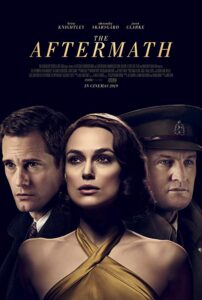

“The Aftermath” is off to a promising start.
Small boy on train is reading aloud from a booklet aimed at Brits adapting to living in postwar Germany, among their beaten foes. “Don’t fraternize,” the kid keeps repeating, stumbling over the word.
It’s late fall, 1946. Pulling into Hamburg, the train lets out Rachel, a beautiful, yet haunted-looking member of that sad club known as The Wives of the Men Already in Germany, i.e. high-level officers from the victorious nations set to repair what can be repaired in the former Reich.

Rachel is NOT about to fraternize with any evil Nazis; they killed her only child in a bomb raid , and they kept her war-fighting husband away for years. Oddly, husband Lewis shows compassion for the survivors of the 1943 firebombing of Hamburg, to the point that he suggests he and Rachel share the patrician villa he has requisitioned with the owner. Herr Lubert, an architect, and his teen daughter Freda, who would otherwise be packed off to some camp, are “good Germans”, Lewis promises: Just a matter of weeks before the man gets his Persilschein, the certificate of clearance from Nazi-involvement that will restore the homeowner to his upper-class lifestyle and job.
Stefan Lubert is blond, good-looking, and of aristocratic bearing. His manners, when showing off his beautiful house on Elbchaussée, where the titled and monied lived, are impeccable. Plus, he’s played by Alexander Skarsgård, irresistible in homemade sweaters.

With Rachel played by Keira Knightley and Jason Clarke co-starring as Lewis, all the earmarks of a satisfying chick-flick are there: gorgeous heroine, stuck with plodding, work-obsessed husband, meets amazing stranger, and is tempted by forbidden love.
The set-up of ”The Aftermath” is intriguing and takes its time. This little known aspect of World War II is fascinating. In Germany it became taboo to speak of the incineration of Hamburg, and the Allied Forces didn’t volunteer information, perhaps out of shame since most of the victims were women and children who either suffocated in shelters or were burned to a crisp in seconds.
Much is made of the secondary characters – the Lubert staff, who sense Rachel is not to the manor born (”she’s making herself at home, like a maggot in the bacon” huffs the housekeeper); the zealous intelligence major and his gossipy wife; the motherless Freda, hanging out with feral orphans. Some of them flash the ominous 88 sign. (Hint: H is the eight letter of the alphabet.)
Then wham, Stefan and Rachel start an affair for the simple reason that they are too good-looking not to.
This is where ”The Aftermath” The Movie lost me. Maybe because I had read ”The Aftermath” The Book, which is an exciting, moving novel by Welsh author Rhidian Brook. He also wrote the screenplay, with Anna Waterhouse and Joe Shrapnel, turning it into an angsty showcase for Keira Knightley. It can’t have been fun, especially since Brook’s original story has two male protagonists, Lewis and Stefan, instead of needy, conventional Rachel.
Rhidian Brook based his book on stories about his grandfather, known as the Governor of Hamburg. In 1946, Walter Brook requisitioned a house in Hamburg for his family and allowed the owners to remain in the house. For five years, a German and a British family shared a home. This was unheard of.
Director James Kent glams up his lead actors in silk and cashmere, but the lovers’ story becomes so banal and flat-out boring, your mind starts to wander. How could the tiny overnight bag Rachel arrived with contain so many party dresses and fancy shoes? Six year’s of war, and Stefan’s sweaters have remained moth-free. How? ”The Aftermath” The Book could have been turned into a terrific TV series. No one ever considered this? And was there no way the book’s super-interesting plot-twist could have been included?
